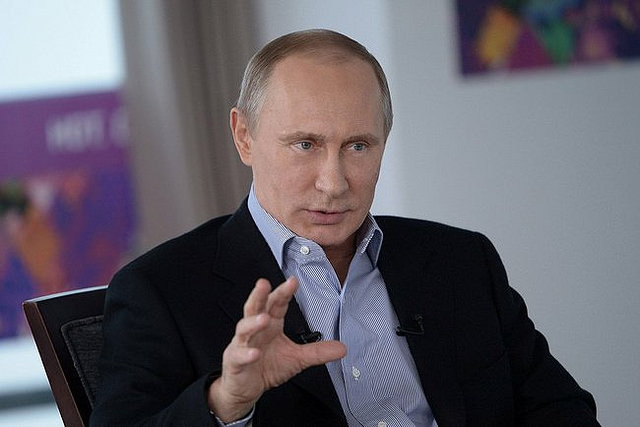 Global Panorama / flickr
Global Panorama / flickr
Putin: The US is the “Only Superpower”, Explained
The mediasphere blew up last week when, during an interview in St. Petersburg, Russian President Putin told CNN’s Fareed Zakaria: “The US is a great power. At the moment, it is probably the only superpower and we accept this fact.” Is Putin signaling that Russia is ready to comply with US demands?
To assess the subtext of Putin’s words, it is imperative to register everything he had to say.
Putin made the superpower comment in context of the US presidential elections. He started off by questioning the true democratic nature of US elections, hinting at Bush’s 2000 win of the electoral vote, but loss of the popular vote. In the end, Putin conceded “that it was none of our business” and that “when the US elects a president we are going to work with anyone, whoever that is.” At face value, these statements indicate Russia’s open-mindedness and desire for compromise. At a deeper level, they are calls for the US to respond in kind.
This led to the key message, not just of the interview, but of Putin’s presidency: “What we do not need of them [US] is to interfere with our affairs all the time, to instruct us how to live. To prevent Europe from building relations with us.”
Recognizing the US as a superpower is double-edged. The phrase is meant to elicit the notion that since the US thinks of itself as a hegemon, it must not feel the need to exercise restraint. The Kremlin has long accused the US of having little respect for state sovereignty.
Thus, when Putin directed attention to the fact that the EU suffers more from sanctions than the US, he struck a raw nerve. The European private sector has seen losses, and politically, there is resentment over playing a secondary role to the US, a sentiment which Putin taps into.
Putin’s stance on NATO has not changed either. When prompted to assess the recent military buildups on the continent, Putin suggested that the civil war in Ukraine and Western condemnation of Russian intervention, are “probably aimed to gain grounds behind the existence of NATO”. This puts the US in a negative light as a state pushing for confrontation, leaving Russia no choice but to respond with preemptive measures.
Finally on Syria, Putin again urged that “We need to go step by step with the participation of all the sides”, and stressed the importance of continued political negotiations. A few days after the CNN interview, on June 17, reports noted that Russia bombed US-backed Syrian rebels near the Jordan border. When a US airborne command post tried contacting the Russian pilots directly, they got no response. On June 19, Russia’s Defense Ministry denied the bombings.
So does Putin acknowledging that the US is a superpower really change anything? No.
But the statement does set the stage for an evolving political landscape.
On June 23, the UK decided to leave the EU. Conspiracy theories that Russia is working to break up the EU are as farfetched as those that NATO wants to break up Russia. However, Putin is deserving of an opportunist label and if there is a way to exploit the situation, he will.
This is unlikely to involve militarized invasion, though Putin has been prodding Western limits for years, ranging from cyber-attacks to military deception. There are benefits to remaining in the grey zone, both because it is very hard to pin Russia with anything and because it reduces the chance of Russia’s provocations inciting open conflict. As experts agree that the US military’s globe-spanning force would destroy Russian forces in a direct stand-off, it is unlikely Russia needs or wants a conventional war. Instead Russia will continue to pursue a brand of hybrid warfare, deeply based on a strategy of reflexive control* developed during Soviet times.
As the situation in Europe evolves, it is likely that Putin will attempt to gain favor with a post-Cameron UK and economically vulnerable EU, offering up solutions that rest on compromise. This may include trade deals, collaborating on the war against terror, and climate change negotiations, all likely requiring some alleviation of sanctions. The US will have to make a value judgement: Keep the pressure on, or ignore violations that do not directly affect US national security.
* Means of conveying to a partner or an opponent specially prepared information to incline him to voluntarily make the predetermined decision





